
Person Sheet
See: Family
| Name |
Roy NEWTON Ph.D. |
| Birth |
12 Feb 1904, 15 Th Ave. , Cordele, GA |
| Death |
27 Jul 1974, Big Rapids, MI |
| Burial |
Highlandview Cemetery, Big Rapids, MI |
| Occupation |
College Professor, Author:
"How
to Improve Your Personality" |
| Education |
BS, 1925, Asbury College; Honorary LLD, 1968, Ferris State |
| Religion |
Methodist |
| Father |
Luther Samuel NEWTON (1874-1935) |
| Mother |
Elizabeth Ellis 'Lizzie' BLACKSHEAR
(1880-1978) |
|
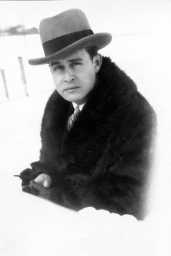 |
| Spouses: |
| 1 |
Dorothy Vernon CRAMMOND |
| Birth |
22 Sep 1905, Newton, IA |
| Death |
10 Jul 1981, Big Rapids, MI |
| Burial |
Highlandview Cemetery, Big Rapids, MI |
| Occupation |
Choir Director, Housewife, Reporter, Piano Teacher, High
Sch |
| Education |
B.A. Music And English, Assoc. Arts, Arts And Crafts Asbury |
| Religion |
Congregational |
| Father |
Charles Chester CRAMMOND (1878-1939) |
| Mother |
Margaretha Katherine Johanna
HEIDECKER (1880-1969) |
|
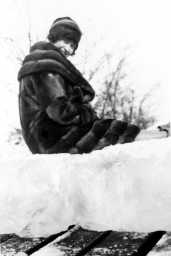 |
| Marriage |
11 Aug 1927, Lansing, MI |
|
|
|
|
|
|
| Last Modified 13 Feb 2003 |
Created 15 Mar 2003 by EasyTree for Windows |
Contents *
Index *
Surnames *
Contact
Also:
Glen
Newton Says:
Dear Newton Relatives,
"The evil men do lives on after them; the good is oft
interred with their bones." - from Shakespeare's Julius Caesar.
Well, not always. I was delightfully surprised when
Russ and Genevieve Brown, next door neighbors during the years I lived in
Big Rapids, Michigan, sent me a clipping praising my father, Roy Newton,
who lived from February 12, 1904, to July 27, 1974.
This is from Hugh Morrow’s column, “’Nuff
Said”, on page 4A of The Big Rapids Pioneer, Monday, March 24, 2003.
The column starts, “I am wondering how or why Woodbridge N. Ferris decided
to establish a school in Big Rapids?”, then reminisces about Ferris.
This is in the middle of the article:
Roy Newton graduated from Duke University I think in
Durham, N.C. [Editors’ note: He attended Trinity College, which is now
Duke University, and graduated with an A.B. from Asbury College in Wilmore,
Kentucky, in 1925.] There was an excellent teacher - someone who would make
you look forward to attending his class! I took a couple of classes from
him, business English, history of education, what else? This instructor lectured
for an hour once on how “LUCK” plays a part in your accomplishments.
I loaned my notes from that class to Bob Davis or Bay City or Flint and never
seen them again. What a bummer?
There should be a dorm or a building of some kind named
after Roy Newton. He probably taught at Ferris 30 or more years. I could
tell you of a private conversation I had with Mr. Newton in the 1950’s
that made a powerful impact on my life. I shall always remember his interest
and help, I shall write about it one day. Newton Hall, Roy Newton Building
Number One. Hey, he was so good the board should name two buildings after
him Roy Newton Building No. 1, and Building Number 2, I am not kidding he
deserves it, I am serious.
[The punctuation above is exactly as it is in the
article.]
Dad always enjoyed visits from former students, who
held him in high regard, and it was heartwarming to see that nearly 29 years
after his death he is still remembered. Incidentally, there was a movement
to name a Ferris building after Dad, spearheaded by Larry Martin, a faculty
member at Ferris. Unfortunately, he lost out in the naming competition to
wealthy donors.
Sincerely, Glen Newton
+
-
Author: Book
"How
to Improve Your Personality" by Roy Newton; Gregg Pub. Division, McGraw-Hill;
Explains just what personality is, its importance in daily life, and how,
by practice and self-determination, anyone can overcome personality problems
and develop good traits. From the preface: "The development of an effective
personality cannot be left to chance"--actually, despite its outdated charm
this book has many useful pointers on how to recognize and control how others
see you.
This was actually a featured (humorous) reading on the National Public Radio
show "This American Life", on November 8, 1997^ December
13, 1996; A reading from "How To Improve Your Personality" (1942) by Roy
Newton, published by McGraw-Hill. It was used as an example of how our society
(more so in 1942) advises men to appear masculine and avoid any appearance
of being feminine or a "sissy"
^
See also:
-
http://people.stu.ca/~nicholso.staff/borshuk.htm
A few years after the introduction of Gordon Allport' s pioneering Personality:
A Psychological Interpretation (1937), Roy Newton, dean at Ferris Institute
in Big Rapids, Michigan published a college textbook entitled How to Improve
Your Personality (1942). In the latter text, Newton urged college students
and aspiring professionals to develop personal and aesthetic qualities attractive
to prospective employers, potential mates, and social leaders: "Regardless
of the job or profession you intend to enter, you cannot escape the tremendous
importance of personality" (p. 7, emphasis added).
Editions: It went through three editions, from the original by Roy to the
next one adding a co-author well-known in academics to the third edition
adding a second co-author who had a reputation among secretarial schools.
-
1st. edition 1942 1
-
2nd edition 1954 1956 1958 hardcover with F.G. Nichols, Illustrated by Ernie
Barth1
-
3rd edition 1963 hardcover with F. G. Nichols and Helen Hinkson
Green1
(link has innacurate info)
-
Published Georgia Educational Journal March, 1939 an article about his great
uncle James Appleton BLACKSHEAR
-
The National Cyclopedia of American Biography, Vol. 59, James T. White
& Company, Clifton, New Jersey (1980) pp. 255-256. Article “Newton,
Roy”.
Roy put on his fake nose, glasses (attached to the nose), and buck teeth
for this gag photo of someone who might be eager to improve his personality
since he couldn’t get by on looks alone.Image was scannedin the frame
behind the glass to avoid risk of damage.
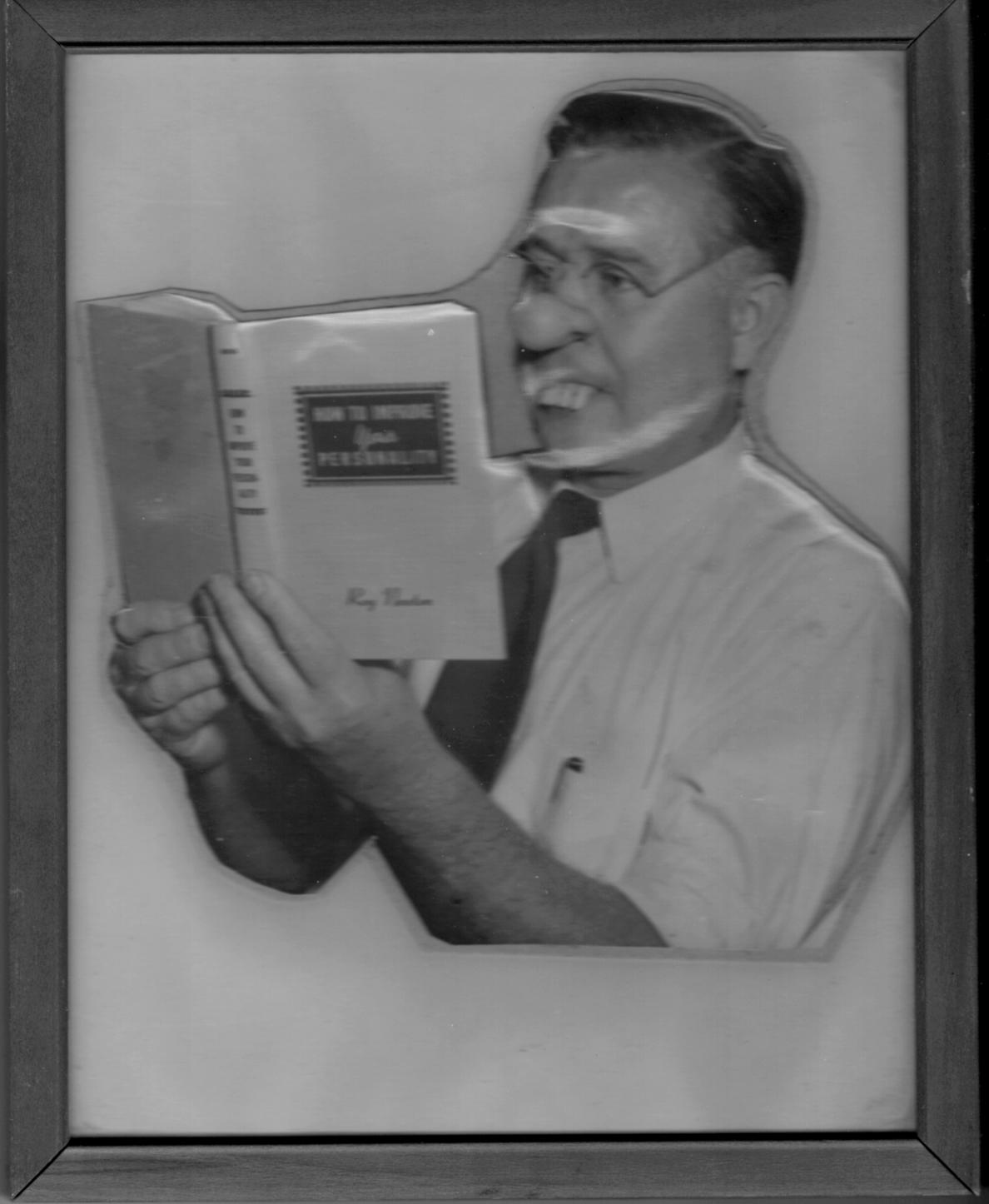
Dictionaries (by
Glen Newton, edited by
James Newton)
Published in 1964, the controversial Merriam-Webster’s Third New
International Dictionary was widely criticized for not capitalizing
“god”. Dad wondered what precedent there might have been for this,
and he soon discovered that “experts” in the history of dictionaries
had been using secondary sources, not the dictionaries themselves. That got
him started collecting old dictionaries, researching their contents, and
planning a book on the history of dictionaries.
He never completed the book, but along the way he found a couple of kindred
spirits – Gene Freeman, an electrical engineer from California, and
Warren
Cordell^,
a vice-president of the Nielsen Corporation. Neither of them was a writer,
but Warren contributed his statistical knowledge to the project by trying
(unsuccessfully) to convince Dad that he didn’t need to count all the
words in a dictionary; he could pick a random sampling of pages, count the
words on them, and then estimate the margin of error in the
mathematically-derived total.
Dad created a business card for his dictionary collection, whose first line
was “Roy Newton—Books”. (Note the punctuation – an em-dash,
rather than a hyphen.) After a while he got a few advertisements in the mail
addressed to “Dear Mr. Newton-Books.”
A good source of old dictionaries was The Antiquarian Bookman, a newsletter
for dealers in old books. By coincidence (at least I think it’s
coincidence), there’s now a bookstore in Blackshear, Georgia, by that
name. (Blackshear is one of our family names. Dad’s mother’s maiden
name was Elizabeth Ellis Blackshear.) The newsletter was hand-typed. The
most amusing issue that Dad received began with this apology:
Letter between r and t broken. Will fubftitute f
inftead.
This way of spelling words in the newsletter would be perfectly natural for
the newsletter’s audience. (If you’ve read very old printed texts,
you may have observed what appears at first glance to be that same substitution
in certain locations within the word, but if you look closer, you’ll
see that the middle crossing line goes to both sides of the vertical line
if the letter is an “f” but only halfway across if the letter is
an “s”.)
With a college teacher’s salary, supplemented only by income from the
latest edition of “How to Improve Your Personality” and Mom’s
church organist salary, Dad’s budget for dictionaries was very small.
Once when he received a collect call, which he accepted in case it was important
news about a family member, he was angry when it turned out to be someone
calling to try to sell him a dictionary at an inflated price. There was a
belief among the general populace that if it’s old, it must be very
valuable. Those not in the business routinely forgot that condition, rarity,
and suitability for a particular project have a major influence on the value
of a book. Invariably, these were worthless to him, and the sellers wanted
much more than the dictionaries would have been worth to anyone.
Unfortunately, when Warren, with his lofty income, began collecting dictionaries,
it drove the market up, and after a while, the remaining books Dad was interested
in were out of reach of what he could afford to pay. By then he had collected
over 1600 dictionaries and his direct access to the tomes gave him an insight
missed by many experts in the field. He learned, for example, that Samuel
Johnson’s famous dictionary was not the first English-to-English dictionary.
Indeed, a dozen or more preceded it, beginning with Robert Cawdrey’s
“A Table Alphabetical …”.
^
^
He also shared some rather amusing definitions from various old dictionaries:
{ed: Some paraphrasing here}
-
“oats” – 'a grain, which in England is generally given to
horses, but in Scotland supports the people.'
^
(To which James Boswell, Scottish lawyer, diarist, and author is said to
have replied: "... that's why in England you have better horses, and in Scotland
we have better men")
-
“chirurgeon” – One who cuts hair and bones.
^
-
“condog” – given as a definition of “agree”, resulting
from the dictionary writer’s assistant in the next room asked him to
repeat the definition “concur”, because he was in the next room
and didn’t hear it the first time. “Cur” is slang for
“dog”, and the dictionary writer peevishly replied
“condog.”
-
“Eclipse” – 'The obscuration of a luminary' (an example of
defining a two-syllable word in terms of two 4-syllable words)
^
Neither Cordell nor Freeman was a writer, so the task of putting the Magnum
Opus, the dictionary history, on paper fell to Roy; but he never seemed to
get around to starting it. He gave up about the same time that Warren, who
had his own collection of old dictionaries, was negotiating with his alma
mater, Indiana State University, about donating the entire collection. He
approached Dad about purchasing Dad’s collection to include in the donated
collection, which would provide an unparalleled resources for the students
in Indiana State University’s Master of Library Science degree. Dad
sold all except a few that he kept for his own continuing research.
http://library.indstate.edu/about/units/rbsc/cordell/cordell-idx.html
A clipping from Virginia Deupree's "River Ripples" column in the Monday,
October 2, 1972, Big Rapids Pioneer includes this item:
"Roy Newton, retired Ferris professor, recently sold 640 volumes of his
dictionary collection to Indiana State University, Terre Haute, Ind. The
remaining 350 volumes will go to Indiana State when Roy has completed his
research on the history of the English dictionary since 1604."
"Roy, himself a walking dictionary, reports that his oldest volume is the
Latin-English Dictionary by Cooper, printed in London in 1565, the year after
Shakespeare was born."
Other
Pictures
Typed caption reads:
Roy Newton: Photo taken in Lansing, Michigan when "He was young and fair, With wavy hair, And all his teeth" 1943
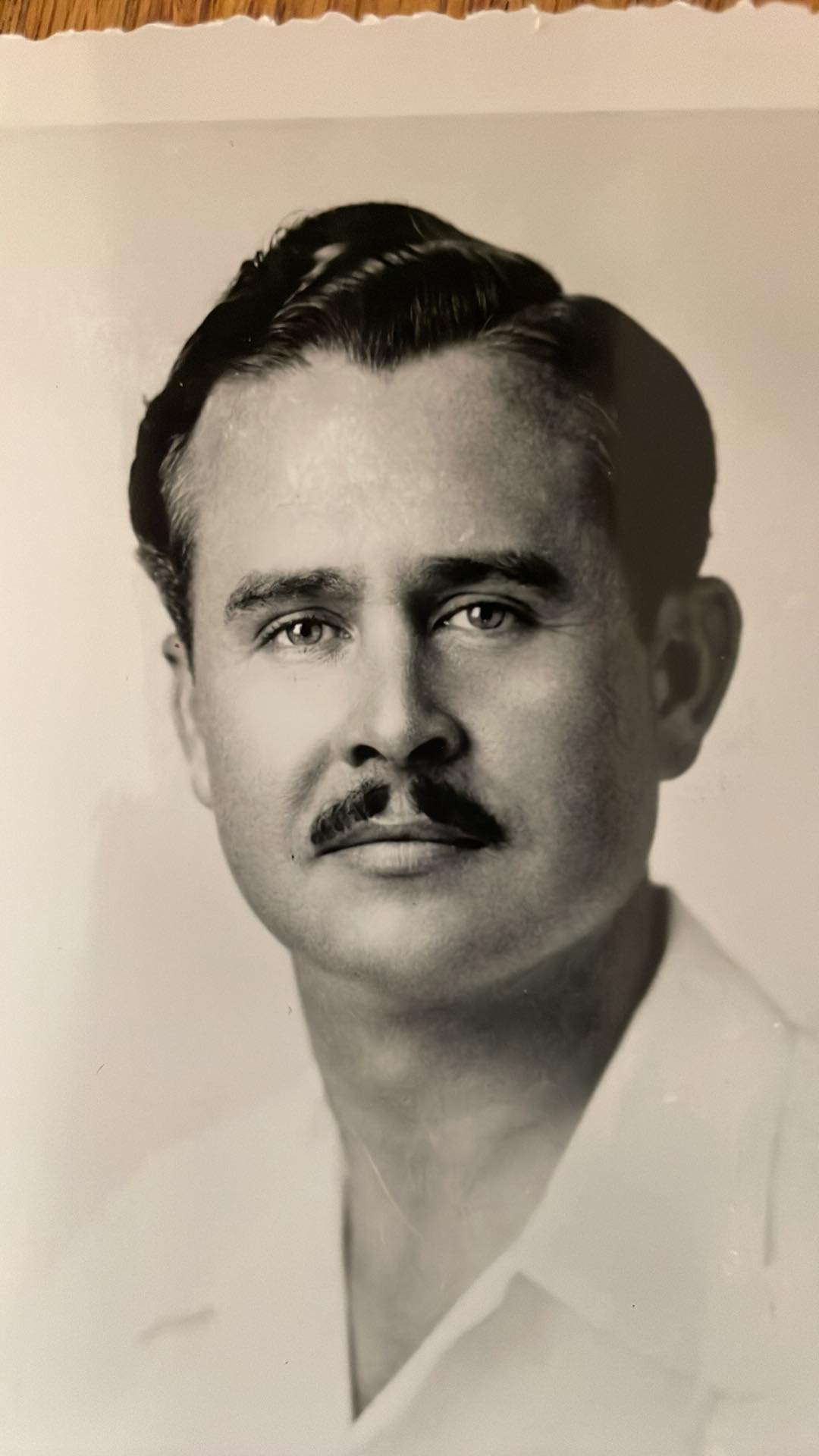
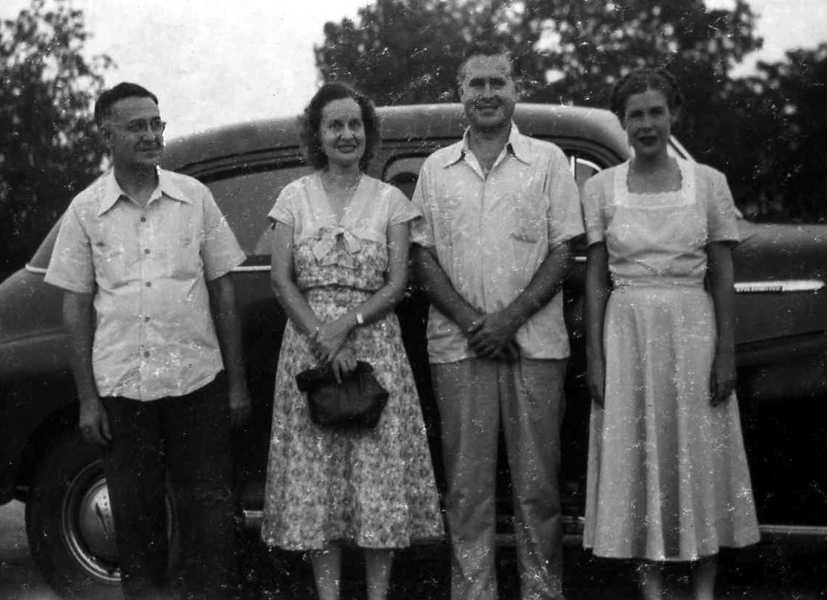
From left to right: Perry,
Frances, Roy, and
Celia; Photo thought to have been taken
between 1935 and 1937
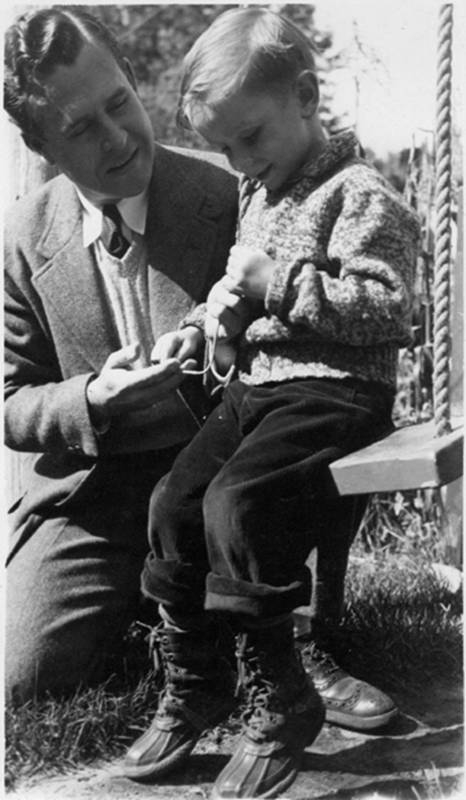
Roy and David Newton. Thought to have been taken
Oct 1941
Roy with Glen at 5 weeks. Here's an excerpt from
Roy's March 19, 1947, letter to Perry:
"Biggest news here is that we are expecting a baby the last of June or first
of July. At our age! The whole family, however, is delighted. Jim and Dave
are very happy about it. It would make you laugh to see how solicitous Dave
is of Dorothy, telling her where to step, and not to bend over, and watch
out for that little patch of ice on the walk, etc. Everybody's hoping for
a girl. Dorothy's bridge club gave her a shower last night, and she got some
very nice baby things. Most of our old stuff has been given away or sold,
but I discovered we do still have the high chair and one of those necessary
toilet seats. I hear diapers are hard to find."
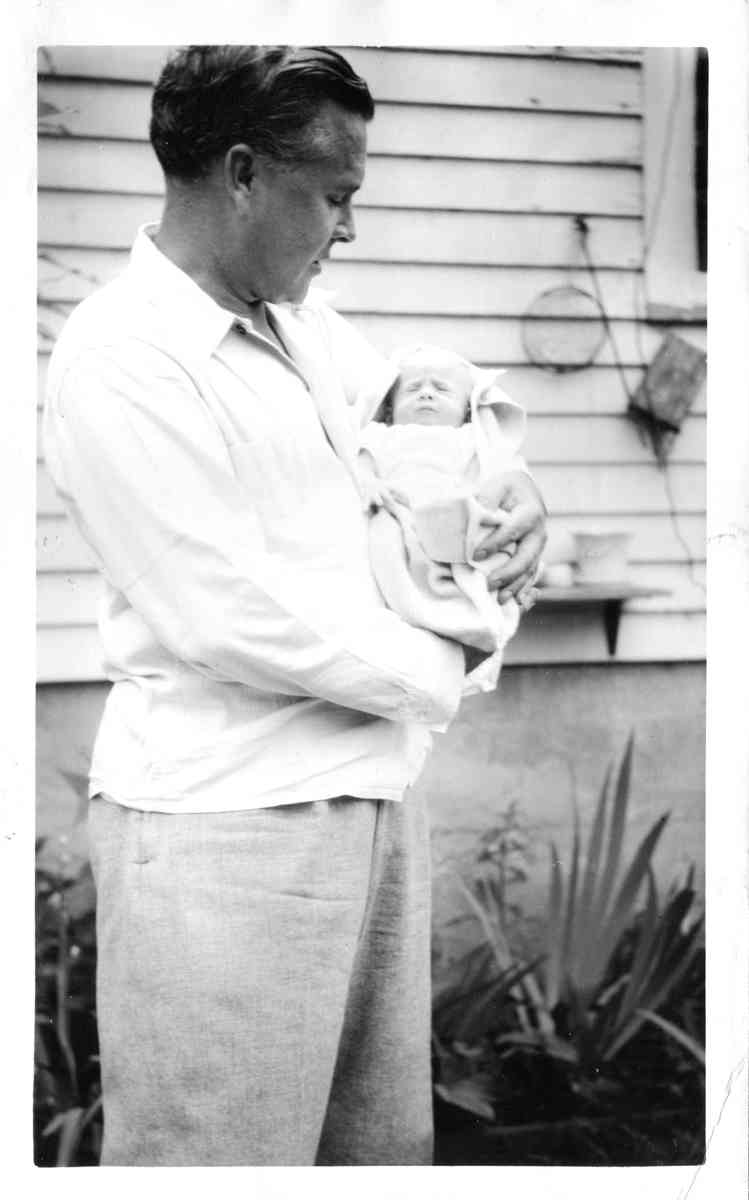
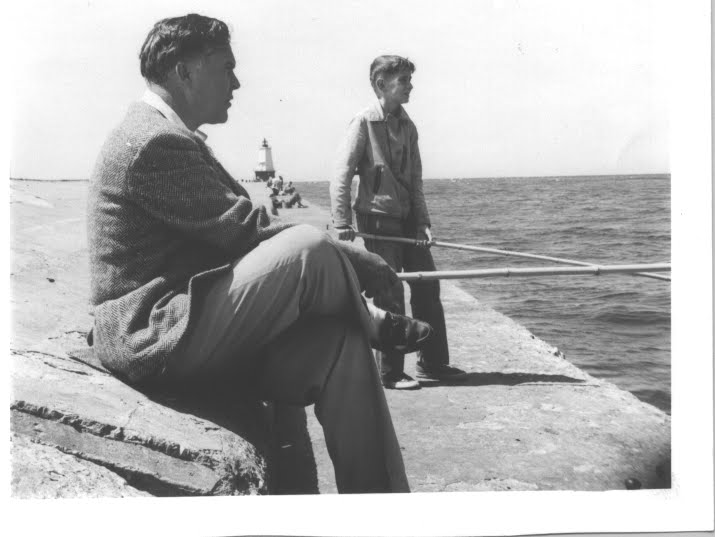
Roy fishing. The young man behind him is not identified.
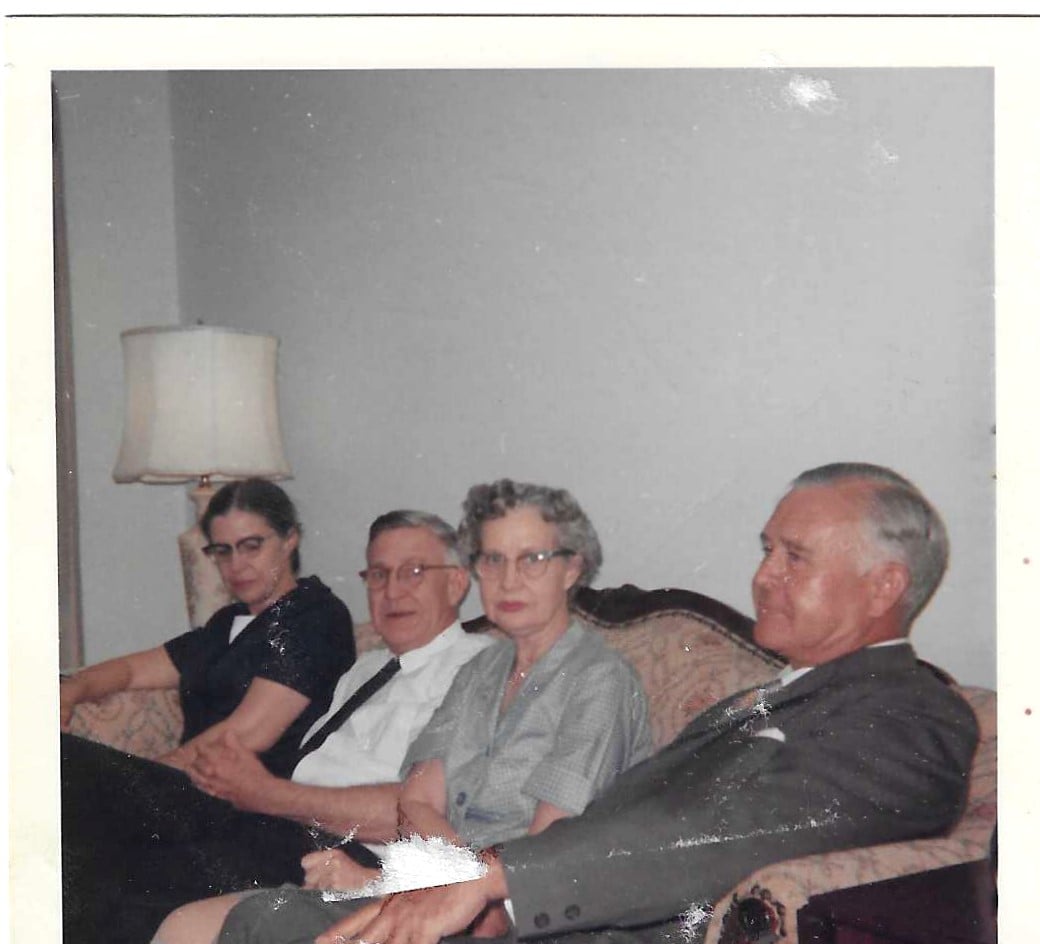
Celia, Perry,
Frances, and Roy in
Red Springs NC, October 1967.
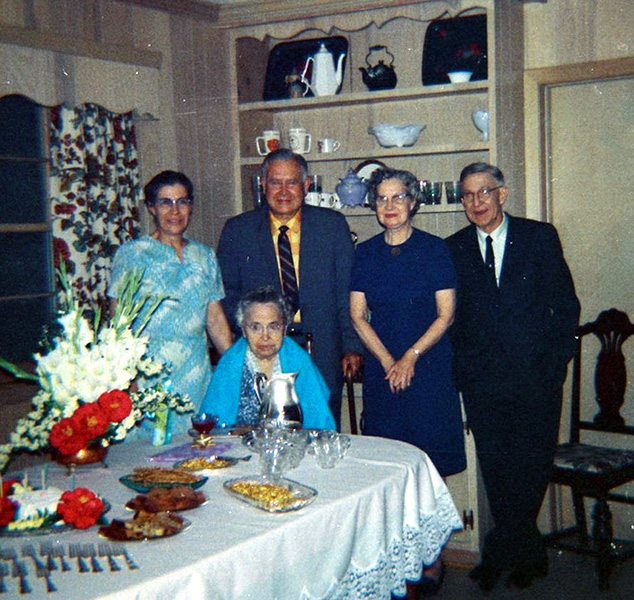
Pictures from the 1969 photo album of Dorthy Newton.
The negative was in a sleeve marked “April-May 1969 S. Carolina,”
The seated person is Elizabeth Ellis
Blackshear, Judging from the presence of all four of her children and
the fancy table setting, we guess that this picture commemorates her 89th
birthday. The standing adults are (left-to-right)
Celia, Roy,
Frances, and Perry.
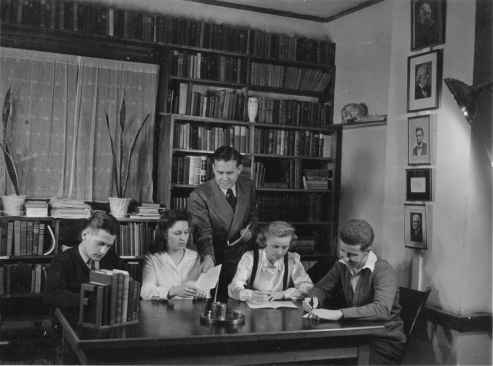
Roy with students in an office. Said to be 1941 on the 3rd floor of the Pharmacy
Building. Note the bookend carved to the letters “FI” for Ferris
Institute. The pictures on the board on the wall start with Albert Einstein,
an unknown person, then Abraham Lincoln, a framed letter, and Woodbridge
N. Ferris. At lower left, lying on its size may be one of the dictionaries
Roy collected; possibly a Cooper’s Dictionary, published more
than 400 years ago and currently held by Glen.
Many of those dictionaries ended up at Indiana State University in Terre
Haute via a gift from alumnist Warren Cordell who had purchased them from
Roy. At one time, part of the set was identified as “The Roy Newton
Collections.”
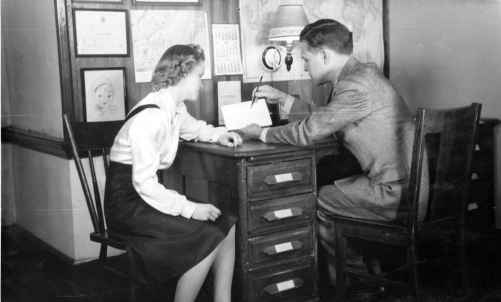
Roy tutoring a student. The portrait to her left may have been drawn by
Dorothy.
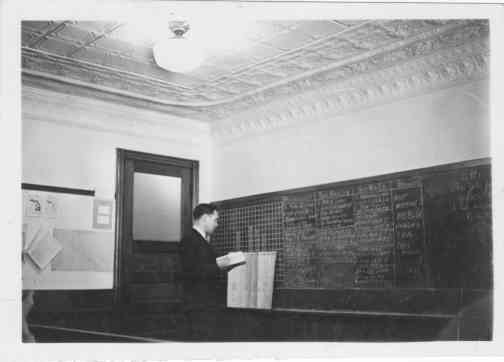
Roy in a classroom. On the blackboard the classes he was teaching that term:
Psychology, Business English, and History of Modern Education. It looks like
there was also a personality interest group, possibly related to his book:
"How to Improve Your Personality". Roy was initially
given a variety of subjects to teach, including English, freshman orientation,
history of education, psychology, and agriculture – whatever the college
needed - sometimes desperately trying to keep ahead of the class! He coached
the debate team and even founded a national junior college debating society.
Eventually he had enough seniority and the student enrollment grew enough
that his request to focus on freshman English was granted. He used the surveys
he took in that class to provide the data for his book.
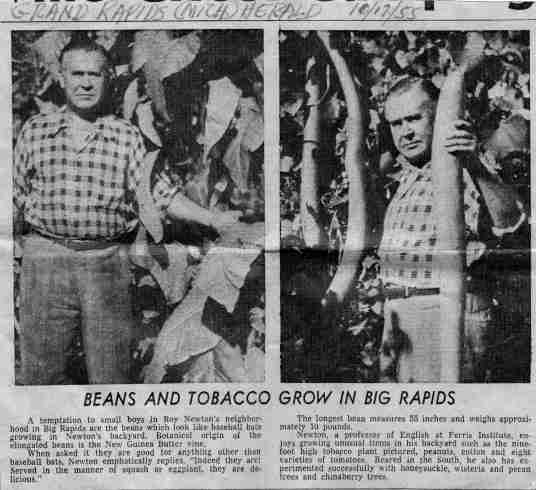
Roy grew New Guinea Butter Beans in the backyard. He painted several of the
beans bright colors and let them dry out in the garage. After a while, the
seeds rattled inside. He harvested some of the tobacco and hung it in the
garage. Although he was a smoker, family do not recall that he ever tried
to smoke the tobacco from the back yard.
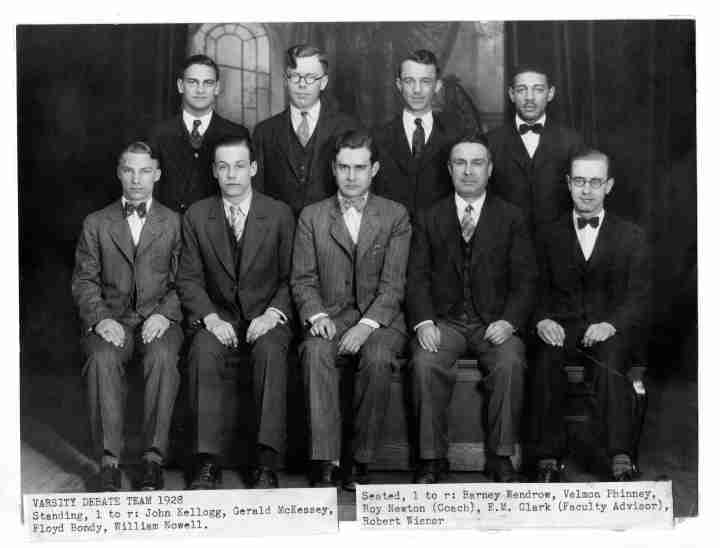
VARSITY DEBATE TEAM 1928
Standing, l to r: John Kellogg, Gerald McKassey, Floyd Bondy, William
Nowell.
Seated, 1 to r: Barney Wendrow, Velmon Phinney, Roy Newton (Coach), E.M.
Clark (Faculty Advisor), Robert Wisner.
On the back: “The Gurley Studio, Big Rapids, Michigan” identifies
the photographer. A small newspaper clipping titled “An Attorney Dead”
with a dateline of Charlotte, Michigan (AP) and a date of July 18 (no year),
reads “Velnon O. Phinney, 24, attorney, was found dead in his gas-filled
office Wednesday night.” This is certainly the person in the front row
whose first name is spelled “Velmon” in the text at the bottom
of the picture.
See William Carson TOLAR Jr. - Celia Evelyn
NEWTON family page for additional pictures.
Glen
Newton Says:
One of the family history artifacts I have is the diary
Dad kept from January 1 to May 11, 1927. He began teaching at Ferris in 1926,
and his diary entries often deal with the challenge of keeping ahead of students
when teaching unfamiliar course material. Here are a few short excerpts,
with my comments in brackets:
From Monday, Jan. 3, 1927:
…
To F. I. [Ferris institute] at 1:00 p.m. … I see by the
board that I am to teach the following
7:00 State Manual
8:30 Psych II
9:15 Psych II
10:00 Ch. Psych
4:00 Agriculture
From 10:45 to 4:00 no class! And a class at 7:00 A.M. Saints preserve us!
A day of the worst kind of discouragement, fear, and dread. My God,
I’d rather die this minute than have to meet those classes
in the morning.
From Tuesday, Jan. 4, 1927:
…
Praise the Lord: no 7 A.M. class! Am going to teach American Literature instead.
More study!
Went to school late this morning thinking there would be nothing doing, and
they were enrolling classes! About 45 in Psych II. No Psych I this term,
thank you.
From Monday, Jan. 31, 1927:
Back to the old grind. Taking up mental imagery in Psych. What I
don’t know about Psych! I’ve reached
the sad, sad conclusion that I am terribly ignorant, and I
didn’t learn anything at college. I was trying to recall
just one thing I’d learned there and it was some task!
My ignorance is really appalling. (That word isn’t spelled
right [it is spelled right], but nobody’ll see it, except
some studious curious great-grandson as he thumbs thru these pages about
the year 2015. May he inherit only the good characteristics of this particular
grandparent.)
+
file: /Techref/other/newtons/ps01/ps01_009.htm, 29KB, , updated: 2022/12/27 13:32, local time: 2025/10/20 11:18,
owner: GEN-NaA-[AA,
216.73.216.53,10-2-207-162:LOG IN
|
| | ©2025 These pages are served without commercial sponsorship. (No popup ads, etc...).Bandwidth abuse increases hosting cost forcing sponsorship or shutdown. This server aggressively defends against automated copying for any reason including offline viewing, duplication, etc... Please respect this requirement and DO NOT RIP THIS SITE. Questions?
<A HREF="http://www.massmind.org/techref/other/newtons/ps01/ps01_009.htm"> Newton Internet Family Tree</A> |
| Did you find what you needed?
|
| |
Welcome to www.massmind.org!
|
.














